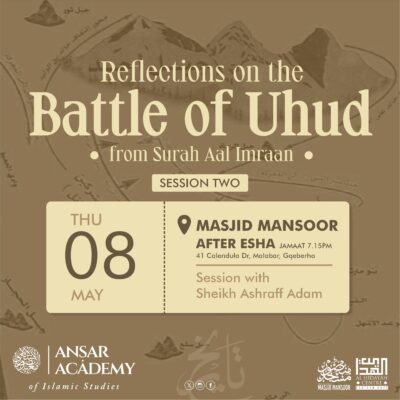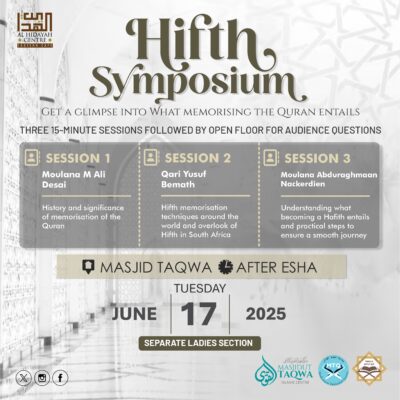We tend to identify going through difficulties and problems as a test. In times of financial turmoil or health problems, we turn to Allah Ta’ala, make Dua and try to rectify the situation. But there is a second type of test and this is when everything is going smoothly in life. Allah Ta’ala terms both these situations in life as a test: “As for man, when his Lord tests him, and thus gives him honour and bounties, he says, “My Lord has honoured me.” But when he tests him, and thus restricts his provision for him, he says, “My Lord has disgraced me.” (Noble Quran, 89:15-16)
In this article we will explore aspects of the test of having abundance, of affluence and of life going your way.
- “Every nation has a test, and the test of my nation is wealth.” (Tirmidhi) Wealth comes with the test of how we approach earning it, spending it and our attitude to others when we have it.
- Ahmed ibn Hambal rahimahullah said, “We were tested with hard times, and we adopted patience, then we were tested with affluence, and we don’t know how we have fared with this test.”
- The Prophet sallallahu alaihi wa sallam remarked, “By Allah, it is not poverty that I fear for you, but rather I fear you will be given the wealth of the world, just as it was given to those before you. You will compete for it just as they competed for it, and it will ruin you just as it ruined them.” (Bukhari) Rivalry and competition for the world’s treasures leads to destruction.
We need to identify and recognise this test of abundance so that we may be able to pass it. Here are some ways in which we can fail the test of having blessings, wealth, health, intellect and business acumen.
- Becoming complacent.
If we have security, health, food, and other blessings with ease, we can start becoming too comfortable. People stagnate when there is too much order and system and tend not to develop. Then some disruption is needed to make you rethink your approach to life and become better. Improvement generally comes out of chaos and necessity becomes the mother of invention. A person loses a job, and this drives him to start something new and innovative. If he had not had this harsh wake up call, he could still be sitting in a mediocre job.
Ibn al Jawzi rahimahullah says that when people become too busy with the blessings given to them by Allah Ta’ala and become negligent, He tests them in these blessings, pushing them towards His door begging for His help. Thus, tests become an actual blessing concealed in the form of a trial to push us out of our comfort zone.
Yahya al Bakka rahimahullah once asked, “Why do I always make Dua but I seem not to receive an answer?” He was told that Allah Ta’ala loves to hear your voice calling out in Dua. Desperate times force us to resort to Dua and plead for Divine assistance.
- Becoming unmindful.
Having everything come to us on a plate might makes us become complacent and stagnate, which in turn leads us to become unmindful. Two blessings are such that many people are deceived with regards to them, good health and free time. (Bukhari) Good health is taken for granted. It is only when we face a health issue that we start to appreciate the simple bodily functions that we take for granted like walking, sight and so forth. We move around doing daily tasks without thinking twice about what we are doing.
Free time is also something that we tend not to appreciate until we are deprived of it. People say that they are too busy, that there are not enough hours in the day. The reality is that it could be we don’t have enough hours because our time management may be at fault. Ask a person in this age of social media who had a full day what his or her habit is at night. Often, they are sitting for 2-3 hours browsing the internet, catching up on chats, watching clips, playing games, and getting up to speed with their social media. We must then ask if these late-night hours are not actually free time?
There is a condition in this age of social media called Revenge Bedtime Procrastination. This refers to a person refusing to go to sleep because they value the freedom of late-night hours more than the much-needed sleep. This condition often affects those who are busy like parents and overworked employees. It is seen as a way to gain control over your time and reclaim hours for yourself and a way of getting revenge for not having control of daytime hours. The reality is that we have actually found time one way or another, just that we are not using it in a productive way. Why not use this time for something beneficial?
- Becoming conceited.
Having abundance and not facing any challenges on earning, etc leads to complacency and being unmindful. This in turn can lead to bigger issues such as conceit or vanity. Called ujub in Arabic, it is a form of what is called narcissism. Ujub means to think of the blessings one is enjoying as tremendous and then to rely on those blessings. It means that you think good of yourself to such a degree that you become self-reliant, thinking that you are the architect of your success, and you forget the true giver of all blessings – Allah Ta’ala. You become preoccupied with the blessings you have; the business savvy, the intelligence, being able to grasp concepts in your studies with ease, your ability to make a plan in any situation, and you forget to attribute it to Allah Ta’ala.
The quality of relating whatever you have to Allah Ta’ala keeps conceit away. The cause of having conceit is ignorance of the fact that every blessing and skill is ultimately from Allah Ta’ala. “Whatever blessing you have is from Allah.” (Noble Quran, 16:53) Imagine someone you love gives you a gift and you become so preoccupied with the gift that you ignore and forget the giver! How absurd. Allah Ta’ala is our Beloved. He gives us gifts and it would be an injustice that we are so occupied with the gifts of wealth, intelligence, and skill that we forget the Beloved!
So ujub or self-conceit means that we think ourselves great due to the blessings we have. It does not necessarily mean that we look down on others or compare ourselves to them. A step up from this is kibr or arrogance. Here we begin looking down on others because we feel a sense of superiority. The highest form is takabbur or pride where we actually act as though we are better than others.
All these are serious spiritual and moral diseases which can destroy us. A Hadith of Bayhaqi lists a man being pleased with himself, having conceit and vanity as a destroyer.
“Allah has surely blessed you with His help on many battlefields, and on the day of Hunain, when your great number pleased you, then it did not help you at all, and the earth was restricted for you despite all its vastness, then you turned back on your heels.” (Noble Quran 9:25) On the occasion of the Battle of Hunain, the Muslims rejoiced at the size of their army. This was in a good cause for Jihad yet the attitude of thinking we are something, and that we can achieve victory due to our numbers and military strength was frowned upon.
Attributing your success in life exclusively to yourself and not even entertaining the possibility that these blessings can be taken away at any time by Allah Ta’ala is ujub or conceit.
Furthermore, it is not a sign of Divine acceptance that we are given the blessings of this world. In fact, if we get further away from Allah Ta’ala despite having so much, if the wealth makes us restless and there is no ease, if it means that families drift apart, then we need to understand that to be an istidraaj, a means of giving us rope to eventually be punished severely. How many a family was united when life was simple and tough, yet they drifted apart when abundance came in? What blessing is this in reality?
- Abuse of blessings.
The next step in failing the test of abundance is to abuse the blessings which we are granted. Blessings take many forms: wealth, intelligence, health, power and authority to name a few.
“And when We intend to destroy a habitation, We command its affluent people (to do good), then they commit sins therein, and thus the word (of punishment) becomes applicable to it (habitation), and We annihilate it totally.” (Noble Quran 17:16)
A large proportion of the abuse of kids and the vulnerable in society is carried out by the wealthy as is the exploitation of the weak. The sins of gambling and others have masses of wealth poured into them. The morals of society erode, and abuse of power comes into play. Employers taking advantage of desperate workers and those with military might feel they are beyond accountability for what they do. Israel has decimated villages in Palestine, people are cut off from their livelihood, enduring abuse, killings, and humiliation.
A test was conducted called the Stanford Prison Experiment. Some college students were made to act as guards and others as prisoners. By the second day abuse of power was being witnessed and by the sixth day the experiment had to be stopped as the abuse was causing trauma, cruelty and tyranny. What actually stops us from such animal behaviour except our sense of Taqwa or consciousness of Allah Ta’ala, and the sense of accountability to Him?
At a community level we need to ask ourselves if we are at times also falling short in this regard. Not following parking rules in public spaces means that we have a sense of entitlement, that we know better, and no one can dictate to us.
Narcissism can become a mental health disorder. We start to crave attention. We believe we are unique and feel entitled. We lack empathy for others. In relationships this is a common cause for disagreements: each party feels that they know best, are not willing to concede any faults within them, and are unable to acknowledge the other as a human being with shortcomings. Narcissism can become an infatuation and obsession, making yourself the centre of the universe. In the wake of this we leave a trail of hurt, destruction, trauma, harm, and frustration in those we love.
The solution.
How do we go about solving this problem?
- Firstly, understand that success is an undeserved gift from Allah Ta’ala which is not dependent on my efforts or skills. Always attribute the gifts to Allah Ta’ala. Prophet Sulaiman alaihis salaam, who was blessed with the treasures of the world, said, “This is by the favour of my Lord, so that He may test me whether I am grateful or ungrateful.” (Noble Quran 27:40) Qaroon on the other hand said, “This is given to me because of the knowledge I have.” (Noble Quran 28:78)
- This approach of the Prophets towards the gifts and blessings they were given answers the question of whether we are then allowed to have self-esteem. Yes, we can because we have been chosen by Allah Ta’ala for those gifts, so we need to appreciate His blessings. Prophet Sulaiman alaihis salaam spoke about the blessings he enjoyed and attributed them to Allah Ta’ala. There is no problem with this. Moulana Ashraf Ali Thanwi rahimahullah said, “This proves that speaking about the blessings one enjoys is a way of showing gratitude and is not conceit or arrogance at all.” Obviously, we should be careful about who we speak to about the blessings we enjoy because people can have jealousy and not everyone is our well-wisher.
- A Sahabi radhiallahu anhu asked regarding wearing beautiful clothes and that he liked to dress well. Would this be arrogance? He was told no. Rather, for a person to reject the truth and to always feel superior to others is the actual problem.
- To delight in a blessing one has and to feel joy is not conceit when you know that it has come from Allah Ta’ala and that He can take it away. Ponder over our faults and weaknesses to balance the emotions.
- Ibn al Jawzi rahimahullah says that life is a balancing act. When you feel low and your morale is down, remind yourself of your high status in the Sight of Allah Ta’ala, as a representative on earth, endowed with Imaan (faith). And if you feel arrogance, then remind yourself of your origin as a dirty drop of semen, one choke can kill you and a bug’s bite can hurt you.
- Work on removing the conceit if you feel it creeping into your life. Repent, renew your outlook and focus on Allah Ta’ala but do not throw away the blessing. That is not the correct way of dealing with the issue. Use the wealth and other blessings for good. Have self-esteem but always say that this blessing is from Allah Ta’ala.
- If someone praises you, Imam Auzaai rahimahullah advises us to make this Dua which will help us keep the proper perspective, “Oh Allah, You know me better than myself. Do not take me to account for what they are saying and forgive me for the faults within me that they have no knowledge of.
May we be able to handle the test of abundance and affluence by appreciating the blessings we enjoy and not allowing them to make us conceited.








COMMENTS